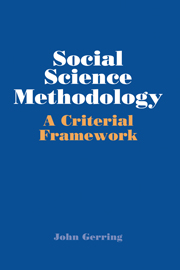Book contents
5 - Propositions: General Criteria
Published online by Cambridge University Press: 05 June 2012
Summary
The logic of historical thought is not a formal logic of deductive inference. It is not a symmetrical structure of Aristotelian syllogisms, or Ramean dialectics, or Boolean equations. Nor is it precisely an inductive logic, like that of Mill or Keynes or Carnap. It consists neither in inductive reasoning from the particular to the general, nor in deductive reasoning from the general to the particular. Instead, it is a process of adductive reasoning in the simple sense of adducing answers to specific questions, so that a satisfactory explanatory “fit” is obtained … History is, in short, a problem-solving discipline. A historian is someone (anyone) who asks an open-ended question about past events and answers it with selected facts which are arranged in the form of an explanatory paradigm.
–David Hackett FischerThe foregoing passage, drawn from Fischer's classic, Historians' Fallacies, proposes that history is a problem-solving exercise. Why did the Roman Empire fall? What factors accounted for the industrial revolution in Europe? Who assassinated John F. Kennedy? History is the study of such questions, just as sociology is the study of a rather different (though not unrelated) set of questions. Arguably, every field and subfield within the social sciences takes its cue from a set of core questions. Anthropology, economics, history, political science, psychology, and sociology are all problem-solving disciplines, in this minimal sense.
But where do these questions come from? What distinguishes a good question from a bad or uninteresting one?
- Type
- Chapter
- Information
- Social Science MethodologyA Criterial Framework, pp. 89 - 117Publisher: Cambridge University PressPrint publication year: 2001
- 1
- Cited by



